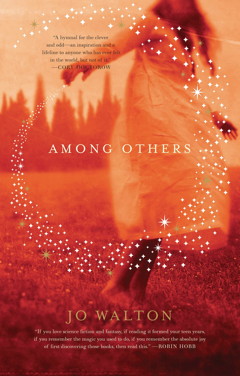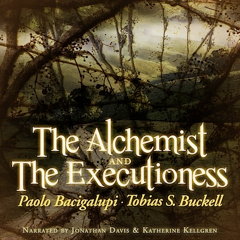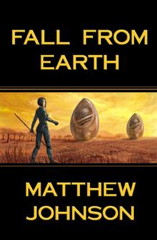
Footprints in the Dust: The Epic Voyages of Apollo, 1969-1975, edited by Colin Burgess. The People’s History of Spaceflight series gets more disappointing with each volume. For the period from Apollo 11 to Apollo-Soyuz, this volume assembles chapters from different contributors, with mixed results — the Apollo-Soyuz chapter reads more as the author’s memoir of watching the launch than as a history of the mission. Particularly patchy about the period’s Soyuz missions and Skylab, and reveals very little about Apollo 11 through 17 that is not already covered in A Man on the Moon by Andrew Chaikin (still the book on Apollo: Amazon.ca, Amazon.com).
Shatnerquake by Jeff Burk. A novella in which all the characters William Shatner has ever played are sucked into our universe with the mission to destroy William Shatner. The Guardian’s Damien Walter calls it “a comparatively mild example” of the bizarro fiction genre, an underground genre focused on the weird — “literature’s equivalent,” says Bizarro Central, “of the cult section of the video store.” Concerning Shatnerquake: truth be told, the concept is a lot more awesome than the execution; the writing was weak and there were a lot of missed opportunities to do something more with the material. Bizarro fiction intrigues me, but I’m now wary of the quality.
The Complete Idiot’s Guide to Buying a Piano by Marty and Jennifer Flinn. Yes, I already have a piano — a digital Roland I bought more than two years ago — but this book was still worth reading. While I don’t regret what I purchased, and where I purchased it, even after reading this guide, boy do I wish I had it back then: it’s really useful intelligence for potential piano buyers who would otherwise go unarmed against marketing bullshit, and it sets out the differences between pianos, what to look for, and what not to worry about. Bought remaindered.
Game Change: Obama and the Clintons, McCain and Palin, and the Race of a Lifetime, by John Heilemann and Mark Halperin. Truth be told, I’ve always been a junkie for inside baseball of the political kind, and this book, which when it came out was the talk of Washington, provides me with that hit. With the revelations about the inner workings of the campaigns — the disaster that was the Clinton campaign, Edwards’ self-destruction, and McCain’s failure to properly vet Palin — it’s abundantly clear that the best-run campaign won. I wonder if that’s a truism. E-book bought through Apple’s iBooks.
Cod by Mark Kurlansky. Short but expansive history of the Atlantic cod, which went from insanely plentiful on the Grand Banks to commercially extinct in five centuries. I skipped over the recipes and wanted more history (the Basques, Massachusetts, the slave trade, the Icelandic cod wars, the collapse of the Newfoundland fishery); it could easily have been three times as long and still too brief.
Beethoven: The Universal Composer by Edmund Morris. Short biography of my favourite composer; looks like a good starting point before tackling longer, more serious biographies; light on the works themselves but provides good context. E-book bought through Apple’s iBooks.
- Footprints in the Dust ed. by Colin Burgess
- Amazon.ca • Amazon.com
- Shatnerquake by Jeff Burk
- Amazon.ca • Amazon.com
- The Complete Idiot’s Guide to Buying a Piano by Marty and Jennifer Flinn
- Amazon.ca • Amazon.com
- Game Change by John Heilemann and Mark Halperin
- Amazon.ca • Amazon.com
- Cod by Mark Kurlansky
- Amazon.ca • Amazon.com
- Beethoven: The Universal Composer by Edmund Morris
- Amazon.ca • Amazon.com
 Today was the official publication date of Jo Walton’s new novel, Among Others. It’s a fantastic book, one of the best I’ve read in a long time. It’s about fairies, and magic — and growing up reading science fiction and fantasy. That sounds like a dissonant combination, but oh does it ever work.
Today was the official publication date of Jo Walton’s new novel, Among Others. It’s a fantastic book, one of the best I’ve read in a long time. It’s about fairies, and magic — and growing up reading science fiction and fantasy. That sounds like a dissonant combination, but oh does it ever work. For our road trip to and from SFContario earlier this month (more on which anon), we listened to The Alchemist and The Executioness, a pair of linked novellas by
For our road trip to and from SFContario earlier this month (more on which anon), we listened to The Alchemist and The Executioness, a pair of linked novellas by  In
In